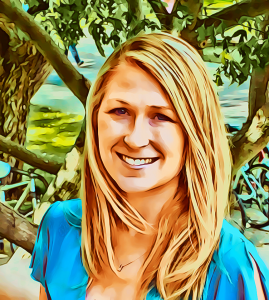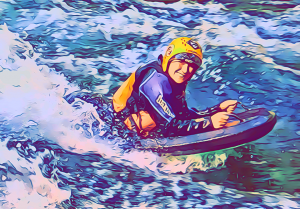158 Letter from Susan Houge Mackenzie

A message in a bottle for future women tourism researchers
In my sister chapter for this book, I drew on an actual and metaphorical river to explore my personal and academic journey and how that informed my contributions to knowledge. This chapter is a continuation of that journey, as it represents the message I would send ‘downstream’ to future women tourism researchers based on my ‘upstream’ experiences.
Begin how you intend to continue. By this I mean, get into good work habits early. I got onto a number of bad work habits when I was a PhD student and early career academic that persist today as an full-time academic with two young children. There are some things that might work short term (e.g., burning the midnight oil as a PhD student; saying yes to every collaboration – more on that later) that are unsustainable over the long term. Creating a boundary between work and home is important to do from the outset, as academic work can easily take over your energy and attentional resources outside far beyond your physical office space. This has never been more true than in the Covid-19 era where online interactions permeate so much of our working lives. Draw firm physical, mental, and technological boundaries (and please email me tips on how to effectively do this when you figure it out).
Keep your horizons open. This is particularly important for early career researchers. During the PhD process, it’s very easy to think that ending up at a top research institution is the be and end all of your existence. This thinking is powerfully reinforced by academic environments, particularly in research-intensive institutions. I found it incredibly helpful throughout my PhD and post-PhD to work in non-academic environments. For example, after completing my PhD with zero publications, I spent six months travelling and working as a river guide in South America. This experience, along with other industry-based and teaching roles, assured me that to life would be okay if I didn’t end up in academia (and might even be better as I could choose where I wanted to live). I’m sure this dilemma is crystal clear to any woman academic who has grappled with deciding whether or not to move their family (or move away from family) halfway across the world to, for instance, a small town in a foreign country for an academic job. The tension between moving where the academic jobs are and ensuring your family’s well-being is a real challenge to consider – regardless of whether children are involved or not. I was fully open to a non-academic pathway before getting my first job offer, and remain open to that path if academic work ceases to be fulfilling or manageable. Having experience and interests outside of academia, and awareness of work opportunities beyond the academic setting, is incredibly helpful for your mental health and your career prospects. While we (supervisors and students) often focus on how challenging it is to get the ideal research position and what we need to do to prepare for that, we often overlook the important question of whether that is actually the most desirable future career and lifestyle. Question this assumption early and often, and stay open to and aware of the many ways one can be a tourism scholar, both within and beyond academia.
Choose your collaborators carefully. Collaborators can be the raison d’être for your work, or the bane of your academic existence. Working with a team has the potential to make you feel incredibly valued and motivated, and good collaborations have formed the basis of my most enjoyable academic work. I’ve found that sharing your research successes and failures with others enhances both of these distinct, but inevitable, experiences. I’m more motivated when working in a team, especially during onerous aspects of research; we create better ideas than any one individual; and collaboration is invaluable when navigating set-backs or challenging peer review processes. My best collaborators have: acted as a sounding board to help me process critical feedback, given me new perspectives, identified ways to move forward, and helped me enjoy all the inevitable ups and downs of the creative process. Importantly, they can also let you know when something is, finally, good enough (see final advice). None of these things are achieved when I sit in a room with only my computer for company.
Now a caveat: While I prefer collaboration, I’m increasingly choosy when it comes to who I spend time collaborating with. I recommend that future women scholars ‘get choosy’ from the outset. Think carefully about what a collaboration will entail, what aspect you will be in charge of, what the collaborator(s) bring to the table, and how much time you can commit. If possible, I recommend trialling a collaboration on a smaller scale, such as via a research note or a conference submission, before embarking on a larger project. A short initial collaboration may tell you everything you need to know about whether this person will be a good collaborator for you – and I don’t just mean in terms of their academic skills. Consider: do I feel energised, excited and valued after working with this person or chatting with them (in person or via phone)? Or, do I feel drained, frustrated, or resentful by our interactions? I think it’s important to pay attention to your emotional experience when working with collaborators as this will often drive how valuable and generative collaborations are, both in terms of academic outputs and your fulfilment at work.
Ensure that you enjoy what you’re doing on a day-to-day basis. This also relates to choosing good collaborators based on the experience of working with them, not just the outputs. Beyond the ephemeral feelings of achievement one gets when completing or publishing an important piece of research, its important that you actually enjoy the day-to-day business of being a researcher. For instance, this will involve a lot of time in meetings, teaching, marking, on computer screens, answering emails, and responding to criticisms from reviewers, administrators, and sometimes even students. Consider these myriad activities in addition to research activities and outcomes, and ensure that these are things that you enjoy, are motivated by, and will ultimately help you thrive on a day-to-day basis.
Find outlets to express yourself that have nothing to do with academic work. In my case, this is playing football and being part of a team where most people don’t know or care what I do for a living. In this environment, I can shed my academic self and be as silly, unprofessional, illogical, or even vulgar as I like (note: this doesn’t mean disrespecting others). I think accessing social and natural environments that allow you to freely express yourself outside of work, hopefully in an unself-conscious way, is a necessary counterbalance to the intense cognitive gymnastics we engage in every day. I access this escape through sport, but for you it might be art, cooking or motorcycle maintenance. It’s not the activity that matters, but rather the way it can take you out of your academic self, reconnect you to the physical/aesthetic world, and reorient you to what really matters in your life. I think this is a key aspect of maintaining mental health as an academic. A corollary to this maxim: seek out friends who are not academics. Engaging with the perspectives of people who have nothing to do with academia is incredibly important to keep you and your research grounded in the real world.
Help other women and seek women mentors. I have never been so acutely aware of how important and valuable this is than in the past five years. Perhaps it’s because I’m finally in a position where I have opportunities to help mentor other women scholars. What I’ve found is not only is this an incredibly rewarding opportunity that I feel very fortunate to have, but I am continually impressed by the competency and conscientiousness of the developing women scholars I am surrounded by. I have found that working with emerging women scholars on everything from teaching to research and service is one of most rewarding and invigorating aspects of my current role. I highly recommend seeking out ways to help other women if you are in a position to do so. This need not be formalised – it may be as a simple as offering to give feedback on a promotion application; helping shepherd a promising postgraduate candidate through admissions processes; listening to, and sharing informal advice with, new female colleagues during coffee breaks; or offering a woman a short RA contract in an area of interest to them to bolster their research experience. There are many ways to do this even if you don’t have a formal mentoring role or a large research budget. Seeking out a female mentor can also be incredibly helpful if you are planning to start a family, in terms of discussing how to navigate the unique challenges women scholars face in balancing a family with a successful research career.
Finally, don’t let perfect be the enemy of good enough. This is something I’ve struggled with throughout my career – typified by futile processes such as agonising over the use of semicolons and synonyms, which I do regularly. Cultivate the ability to stand back and say a piece of work is good enough as is. Or, find good collaborators who can help you do this. I don’t mean do sloppy or careless work – reading slapdash research is often obvious, particularly when you are a reviewer. I mean recognise when you have made the point you need make and it is clear, well supported and critically explained, even if it won’t win a Pulitzer. (When you figure this out, tell me how). Even in composing this letter I’ve had nagging thoughts that I’ve missed the really important advice, or that I could’ve said something more meaningful, or articulate. Or used more semicolons… However sometimes you just need to trust yourself, and know when and take your own advice. So, with that in mind, my closing advice is: Click Submit!

Ngā mihi nui,
![]()
Susan Houge Mackenzie
University of Otago, New Zealand

